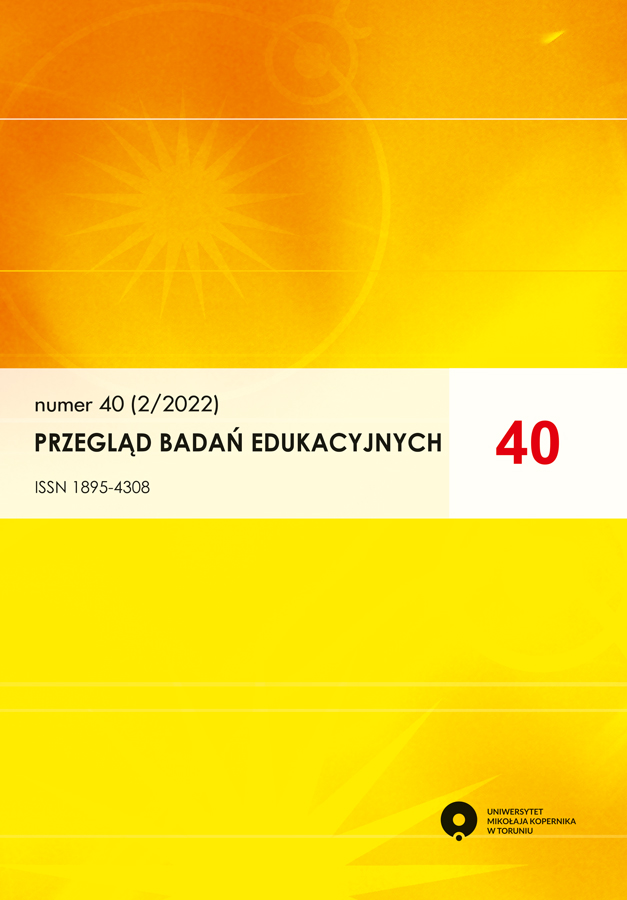Discourses on Research and Researchers: The Case of Portuguese Associated Laboratories
DOI:
https://doi.org/10.12775/PBE.2022.019Abstract
This paper aims to map knowledge produced by associated laboratories in Portugal using the two-phase model of discourse analysis proposed by Sousa and Magalhães
(2013). We analyse the mission of associated laboratories to understand what is (are) the privileged form(s) of knowing in science and the actors involved in that process. We
identify discourse organisers (phase one of the model) and the way discourses become dominant/excluded (phase two of the model). The application of the two-phase model of discourse analysis enables us to conclude that research is being constructed as academic science in a post-academic world and researchers are presented as “in training” or as professors.
References
Araújo, E.R. (2009). “With a Rope Around Their Neck”: Grant Researchers Living in Suspended Time. New Technology, Work and Employment, 24(3), 230–242, doi: 10.1111/j.1468-005X.2009.00231.x.
Bohme, G., Van den Daele, W., Hohlfeld, R., Krohn, W., & Schafer, W. (1983). Finalization in Science: The Social Orientation of Scientific Progress. Dordrecht: Riedel.
Carvalho, T., & Santiago, R. (2010). Still Academics After All. Higher Education Policy, 23, 397–411, doi: 10.1057/hep.2010.17.
Cetina, K.K. (1999). Epistemic Cultures. How the Sciences Makes Knowledge. Cambridge: Harvard University Press.
Edquist, C. (1997). Systems of Innovation: Technologies, Institutions and Organisations. New York–London: Pinter Publishers.
Etzkowitz, H., & Leydesdorff, L. (2000). The Dynamics of Innovation: From National Systems and “Mode 2” to a Triple Helyx of University-Industry-Government Relations. Research Policy, 29(2), 109–123.
Fairclough, N. (2001). Language and Power. Essex: Pearson Education.
Fairclough, N. (2002). Critical Discourse Analysis and the Marketisation of Public Discourse: The Universities. Discourse & Society, 4(2), 133–168.
Fairclough, N. (2003). Analysing Discourse. Textual Analysis for Social Research. London: Routledge.
Funtowick, S., & Ravetz, J. (1993). Science for the Post-Normal Age. Futures, 25, 735–755, doi: 10.1016/0016-3287(93)90022-L.
Galison, P. (1996). Introduction. The Context of Disunity. In: P. Galison, & D. Stump (Eds.), The Disunity of Science. Boundaries, Contexts, and Power (pp. 1–33). Stanford: Stanford University Press.
Gibbons, M., Limoges, C., Nowotny, H., Schwartzman, S., Scott, P., & Trow, M. (1994). The New Production of Knowledge. The Dynamics of Science and Research Into Contemporary Societies. London: Sage.
Hessels, L.K., & van Lente, H. (2008). Re-Thinking New Knowledge Production: A Literature Review and a Research Agenda. Research Policy, 37, 740–760, doi: 10.1016/j.respol.2008.01.008.
Irvine, J., & Martin, B.R. (1984). Foresight in Science: Picking the Winners. London: Frances Pinter.
Jackson, C., & Tinkler, P. (2000). The PhD Examination: An Exercise in Community-Building and Gatekeeping? In: I. McNay (Ed.), Higher Education and its Communities (pp. 38–50). Buckingham: Society for Research into Higher Education/Open University Press.
Laclau, E., & Mouffe, C. (1985). Hegemony and Socialist Strategy. Towards a Radical Democratic Politics. London: Verso.
Merton, R.K. (1973). The Sociology of Science. London: The University of Chicago Press.
Merton, R.K., & Barber, E. (2004).The Travels and Adventures of Serendipity. A Study on Sociological Semantics and the Sociology of Science. Princeton: Princeton University Press.
Nowotny, H., Scott, P., & Gibbons, M. (2004).Re-Thinking Science: Knowledge and the Public in an Age of Uncertainty. Oxford: Blackwell Publishers Ltd.
Nunes, J.A., & Gonçalves, M.E. (Eds.) (2001). Enteados de Galileu? A Semiperiferia no Sistema Mundial da Ciência [The Semiperiphery in the World System of Science]. Porto: Afrontamento.
OECD (2008). Tertiary Education for the Knowledge Society. OECD Thematic Review of Tertiary Education: Synthesis Report. Vol. 2. Paris: OECD.
Santiago, R., & Carvalho, T. (2012). Mudança no Conhecimento e na Profissão Académica em Portugal [Change in Knowledge and Academic Profession in Portugal]. Cadernos de Pesquisa, 41(143), 402–426, doi: 10.1590/S0100- 15742011000200005.
Slaughter, S., & Leslie, L.L. (1997). Academic Capitalism: Politics, Policies, and the Entrepreneurial University. Baltimore: The John Hopkins University Press.
Sousa, S.B. (2010).A ‘Comunidade Académica’ como um Conceito Errático [The ‘Academic Community’ as a Fuzzy Concept]. Sociologia, 20, 149–166.
Sousa, S.B. (2011). The Transformation of Knowledge Production and the Academic Community: Playing the Game and (Still) Being an Academic? Educação, Sociedade e Culturas, 32, 55–71.
Sousa, S.B., & Magalhães, A. (2013). Discourse Analysis in Higher Education Research. In: M. Tight, & J. Huisman (Eds.), Theory and Method in Higher Education (pp. 81–96). Bingley: Emerald.
Sousa, S., & Magalhães, A. (2014): A Research Career? The Portuguese Case. European Journal of Higher Education, 4, 317–333, doi: 10.1080/21568235.2014.915198.
Ziman, J. (1994). Prometheus Bound. Science in a Dynamic Steady State. Cambridge: Cambridge University Press.
Ziman, J. (2000).Real Science. What it Is, and What it Means. Cambridge: Cambridge University Press.
Downloads
Published
How to Cite
Issue
Section
License
Copyright (c) 2023 Sofia Branco Sousa

This work is licensed under a Creative Commons Attribution-NoDerivatives 4.0 International License.
Stats
Number of views and downloads: 469
Number of citations: 0



